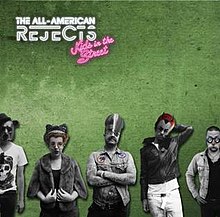Kids in the Street
| Kids in the Street | ||||
|---|---|---|---|---|
 |
||||
| Studio album by The All-American Rejects | ||||
| Released | March 26, 2012 | |||
| Recorded | April–June 2011 The Village Recorder, LA, CA Rocket Carousel Studio, LA, CA. |
|||
| Genre | Alternative rock, power pop | |||
| Length | 43:12 | |||
| Label | DGC, Interscope | |||
| Producer | Greg Wells | |||
| The All-American Rejects chronology | ||||
|
||||
| Singles from Kids in the Street | ||||
|
||||
| Professional ratings | |
|---|---|
| Aggregate scores | |
| Source | Rating |
| Metacritic | (62/100) |
| Review scores | |
| Source | Rating |
| AbsolutePunk | 8/10 |
| AllMusic | |
| Artistdirect | |
| Bloody Disgusting | |
| The Boston Phoenix | |
| Entertainment Weekly | B |
| Melodic.net | |
| Metromix | |
| Rolling Stone | |
| Sputnik Music | |
| The Round House | B+ |
| USA Today | |
Kids in the Street is the fourth studio album by American rock band The All-American Rejects, released March 26, 2012 by Interscope Records.
The All-American Rejects began writing their fourth studio album in mid 2010. During this time the band's songwriters Nick Wheeler and Tyson Ritter went on numerous retreats to their secluded house in Chicago, a writing strategy used for their previous albums. Recording began in April 2011 and wrapped up in June, with mixing commencing the following August and concluding in early September.
"Self-discovery is such an important thing," lead vocalist and bassist Tyson Ritter explained, "I feel like in music you're a virtual Magellan as you discover new, vast territories, sonically and lyrically. If you're not discovering something new, you're not doing it right. I knew we needed to find a different place, and I guess in this accidental sort of...I don't know man, in the journey I found a different way and a new voice for our music and even a new voice for me to sing with."
During an interview with Billboard, Ritter says he had no idea he was going to experience so much life in the three years between the band's last record and this one. “I went from the floor to standing up, and I think the whole record reflects that thematically,” he continued that he acknowledged he fell quickly into an unintentional "a quarter-life crisis" with "women and excess, getting into trouble, pouring too much Jamison's into the ol' noggin, a lot of people I could've done without", he added, "Of course it was destructive, but it wasn't really intentional. I was just having fun. It WAS fun, and coming out of it...thank God for the piano. Really, the music helped me out of it through this cathartic experience of writing the songs."
“We started out having two songwriters, Nick [Wheeler] and I. We’ve always just put together collections of songs to compose a record. We would take writing trips, where we’d write five songs at once, in a house in Chicago. That’s been how our songs have seemed cohesive as records [in the past]. This record actually had a story. We realized we weren’t putting together a collection of songs for the first time, but we were actually putting together a record that told a story”, Ritter explained ""Our goal on this record was to push ourselves into making a sound that was original, beyond, I guess, the other records that we've created as far as not limiting ourselves to just the four-piece rock band instrumentation of two guitars, bass and drums," Ritter explains. "I think when we stepped up to a big wall of keyboards for the first time, I was just like a kid in a candy store."
...
Wikipedia
